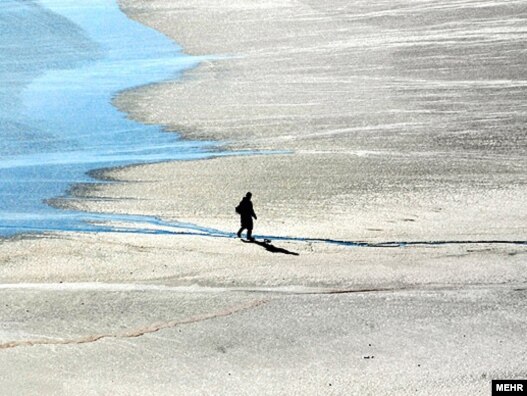Azeri activists arrested in Iran over lake protest
| Publisher | Radio Free Europe/Radio Liberty |
| Publication Date | 15 September 2011 |
| Cite as | Radio Free Europe/Radio Liberty, Azeri activists arrested in Iran over lake protest, 15 September 2011, available at: https://www.refworld.org/docid/4e8973d9e.html [accessed 6 June 2023] |
| Disclaimer | This is not a UNHCR publication. UNHCR is not responsible for, nor does it necessarily endorse, its content. Any views expressed are solely those of the author or publisher and do not necessarily reflect those of UNHCR, the United Nations or its Member States. |
September 15, 2011
 Activists estimate that Lake Orumieh is being deprived of 5.5 billion cubic meters of water annually.
Activists estimate that Lake Orumieh is being deprived of 5.5 billion cubic meters of water annually.
Several Azeri activists in Iran have been arrested after calling on people to participate in the latest protest over the drying up of Lake Orumieh, RFE/RL's Radio Farda reports.
The Association for the Defense of Azerbaijani Political Prisoners in Iran (ADAPP) said on September 14 that the activists were detained after distributing leaflets urging people to take part in a protest in the northwestern city of Ardebil on September 19.
ADAPP said that activists Abbas Lesani, Asgar Akbarzadeh, Moslem Akbarzadeh, Ebrahim Rashidi, Hassan Karimzadeh, Isa Azizi, Nosratollah Valizadeh, Rahim Gholami, Hamid Ghovati, Ali Kheirjou, Mehdi Osouli, Ali Babaie, and Babak Javanshir were among those taken into custody.
Akbarzadeh, who is also a student activist, was arrested by security forces on September 8, while Lesani, a civil activist and former political prisoner, was detained by security forces on September 9 without an arrest warrant.
Lake Orumieh, a salt lake located in Iran's East Azerbaijan and West Azerbaijan provinces, is drying up and turning into a salt marsh.
There have been repeated demonstrations by several thousand people in recent weeks in the two provinces against the increasing aridity of the lake.
Security forces used violence to disperse those protests and arrested dozens of participants.
Activists say that if the present process continues the lake could disappear completely within three years, leaving billions of tons of salt that will pose a health hazard to the local population and make parts of the region uninhabitable for the some 14 million people who live there.
Environmentalists believe the construction of hydroelectric dams on rivers that are tributaries of the lake is the primary cause of the reduction in its size.
Environmentalist Esmail Kahrom told Radio Farda recently that some 35 dams have been built on 21 rivers that feed Lake Orumieh, and 10 more are currently under construction.
"This means Lake Orumieh has been deprived of 5.5 billion cubic meters of water annually," Kahrom said.
Kahrom also mentioned evaporation, drought, and the construction of a highway which crosses Lake Orumieh as other contributing factors to the decrease in its water levels.
Link to original story on RFE/RL website
